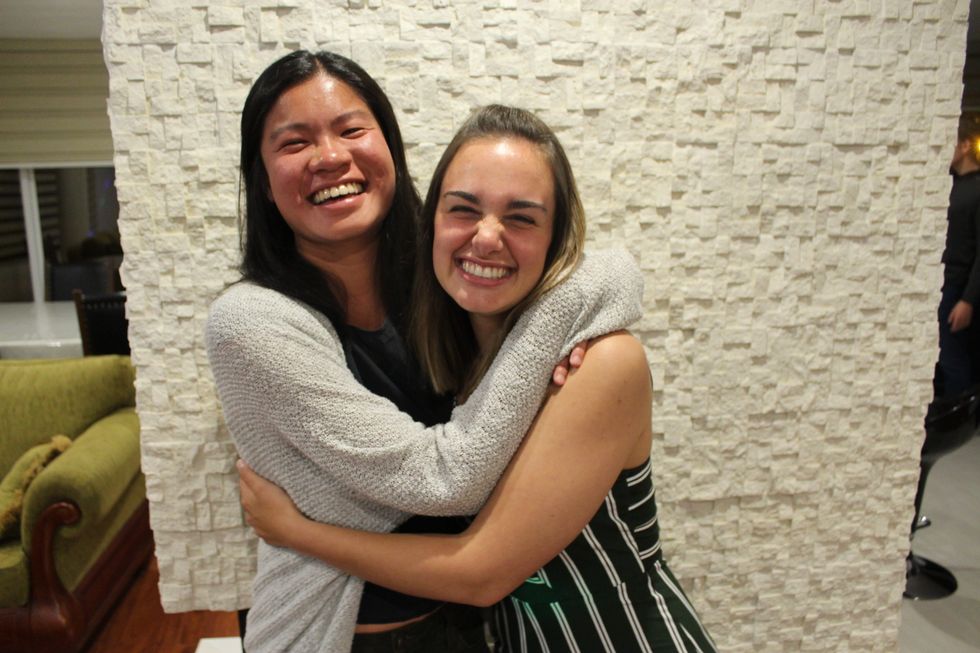Study abroad. Life changing? You hear people describe their experience abroad as so. And though it's a powerful phrase to use, likewise, I agree.
Having lived in Ecuador for two months, I am now at the halfway mark of my study abroad experience and already realize that my time here is an impactful one. Every day, I am learning a lot about the culture and reality of Ecuador and its people through my homestay, classes, and field trips around the country. Though immersed in Ecuadorian culture, I can't help but think about my return back to the U.S. and what my life will be like post-study abroad. How can I incorporate what I've learned here into my daily life at home? Will it be easy to fall back into the routine of SCU or will every day be a struggle with constant reminders of Ecuador? Only time will tell, but I know Ecuador will never leave my heart. Here are my 5 biggest takeaways from studying abroad in the middle of the world.
1. Intentional family and friends time

Amigas!
Jonathan Cito
When I go back to the U.S., I definitely want to be more intentional with my relationships and time spent with friends and family. Here in Ecuador, they value family a lot and every night, we're always eating dinner together. While in the past I would sometimes eat dinner super fast so I could go back to studying, I hope to organize some kind of daily schedule where I take a break from class, clubs, and work to sit down and eat with my family and friends. Because a meal is more than just eating food: it's also about building relationships and forming connections, sharing cultures, and laughing with the people we love and treasure.
2. Slow and mindful cooking

Pambamesa (kinda like a potluck) in the indigenous San Clemente community.
Author
These past few weeks, I've eaten some of the freshest and homemade food I've ever had in my life. Unlike the U.S. where there is a huge culture of takeout and buying pre-made foods at the supermarket, there is an emphasis on slow and mindful cooking in Ecuador. My classes visited many indigenous communities in rural areas that don't eat processed food because it's inconvenient and unhealthy. Consequently? They just make all their foods from scratch and though it takes longer, it's soo worth it. Living here has inspired me to try more recipes and I can't wait to cook up a storm when I live off-campus next year. Swing by mi casa next year for some tasty homemade food!
3. Being aware of the people behind our foods

Harvesting yuca in the fields!
Additionally, my field trips have given me the opportunity to visit many farms and plantations in communities where we would see crops grown in the fields, help with the harvesting, and then later that day would cook and eat the same foods. Literal farm-to-table cooking. The way I view produce after seeing it grown has given me a new perspective, so I am now more aware of the people behind all the foods I buy and consume. Before study abroad, I considered myself a conscious consumer, but at the same time, I am human, and I did buy foods if they were cheaper and more convenient. However, now, I will definitely think twice about my food purchases and who I'm supporting with my dollar.
4. Harmony with the environment and all living beings

Antisana, an ecological reserve in Ecuador.
Author
Many indigenous communities live by the philosophy called Buen Vivir or Sumak Kawsay which translates to "good living" in English and means a harmony with all humans, living creatures, and the environment. The goal behind this concept of life is to not take advantage of nature and its resources but rather have a lesser impact and create an equilibrium among all living beings. Everyone and everything living is equal and has a value. Buen Vivir and Sumak Kawsay is very related to the spirituality of the people as well and has even been incorporated into Ecuador's 2008 Constitution as a guiding principle. I love this way of thinking and definitely want to keep it in mind with my current habits and future career.
5. Greetings and acknowledgements

Me with my American host sister!
Erika Rasmussen
In Ecuador, it's custom to greet and acknowledge everyone in the room when you arrive with a kiss on the cheek or a handshake. If you don't, you're considered rude and people will think you're mad at them. This was a big culture change coming from the U.S. where I've walked into a room and skipped the small talk, so I could immediately get to my point and be done with the conversation with whoever I was talking to. But it's not like that in Ecuador. Ecuadorians always ask, "¿Cómo está?" but actually truly care about your answer. (For the most part. There are always exceptions for everything.) Here's to the future me being more intentional with my greetings. To my friends and family reading this, please keep me accountable.



















